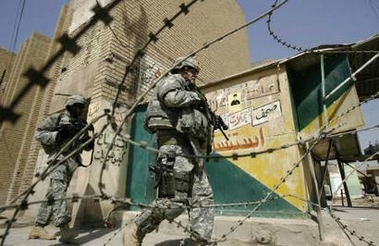More delays in shift to Iraqi control
Updated: 2007-09-20 17:10
WASHINGTON - In another sign of US struggles in Iraq, the target date for putting Iraqi authorities in charge of security in all 18 provinces has slipped yet again, to at least July.
 US soldiers of the 2nd Battalion, 17th Field Artillery Regiment walk during a patrol southeast of Baghdad September 18, 2007. [AP] |
The delay, noted in a Pentagon report to Congress on progress and problems in Iraq, highlights the difficulties in developing Iraqi police forces and the slow pace of economic and political progress in some areas.
It is the second time this year the target date for completing what is known as "Provincial Iraqi Control" has been pushed back. The Pentagon report submitted to Congress on Monday hinted at the possibility of further delays.
The intent is to give the provincial governments control over security in their area as a step toward lessening — and eventually ending — the US security role.
Thus far seven of the 18 provinces have reverted to Iraqi control.
The process has gained relatively little attention in the broader debate in Washington about when and how to get the Iraqis ready to provide their own security so that US forces can begin to leave. That may be in part because some details of the provincial transition process are classified secret.
An independent commission that examined the issue of provincial Iraqi control this summer concluded in a report to Congress on September 4 that the process is too convoluted and an impediment to the overall US goals of speeding the transition to Iraqi control and supporting sovereignty.
"Our current policy of determining when a province may or may not be controlled by its own government reinforces the popular perception of the (US-led) coalition as an occupation force," according to the commission, headed by retired Marine Gen. James Jones. "This may contribute to increased violence and instability."
The commission recommended that all 18 provinces return to Iraqi control immediately. US forces would continue to operate in the areas they are now, in coordination with Iraqi authorities; Iraqi control would mean US troops could transition to less combat-intense roles.
In an interview Wednesday, Jones said he and the other commissioners got the strong impression from Iraqi officials they met in Baghdad this summer that they want full provincial control without further delay.
"The whole process seems to be acting as more of a brake on progress than a help," Jones said. "If the Iraqi government is willing, I think we should be putting as much on them as possible. To have a sovereign government that doesn't control all of its provinces doesn't make a lot of sense to me."
|
|
|
||
|
||
|
|
|
|

